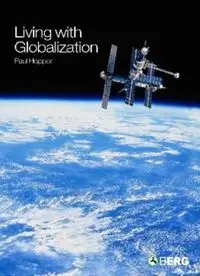
Living with Globalization PDF
Preview Living with Globalization
Living with Globalization This page intentionally left blank Living with Globalization Paul Hopper Oxford • New York English edition First published in 2006 by Berg Editorial offices: First Floor, Angel Court, 81 St Clements Street, Oxford OX4 1AW, UK 175 Fifth Avenue, New York, NY 10010, USA © Paul Hopper 2006 All rights reserved. No part of this publication may be reproduced in any form or by any means without the written permission of Berg. Berg is the imprint of Oxford International Publishers Ltd. Library of Congress Cataloging-in-Publication Data Hopper, Paul, 1963- Living with globalization / Paul Hopper.— English ed. p. cm. Includes bibliographical references and index. ISBN-13: 978-1-84520-192-0 (hardback) ISBN-10: 1-84520-192-2 (hardback) ISBN-13: 978-1-84520-193-7 (pbk.) ISBN-10: 1-84520-193-0 (pbk.) 1. Globalization. I. Title. JZ1318.H67 2006 303.48’2—dc22 2005037132 British Library Cataloguing-in-Publication Data A catalogue record for this book is available from the British Library. ISBN-13 978 1 84520 192 0 (Cloth) 978 1 84520 193 7 (Paper) ISBN-10 1 84520 192 2 (Cloth) 1 84520 193 0 (Paper) Typeset by JS Typesetting Ltd, Porthcawl, Mid Glamorgan Printed in the United Kingdom by Biddles Ltd, King’s Lynn www.bergpublishers.com For Emma, Anna and my family This page intentionally left blank Contents Introduction: Globalization and Complexity 1 1 Globalization and the Third Way 15 2 Globalization and Conflict in Contemporary Europe 35 3 Globalization, Cosmopolitanism and the European Union 57 4 Globalization, Al-Qaeda and Global Terror 77 5 China and Globalization 99 6 The United States and Globalization 119 Conclusion: Living with Globalization 139 Notes 149 Bibliography 159 Index 187 vii This page intentionally left blank Introduction: Globalization and Complexity There is currently much debate about globalization. Some people stress the need to adapt to globalization, others to resist it. But what does it mean to be living with globalization? How do we experience and engage with its processes? And how are governments, societies and different social and cultural groups responding to and contributing to it? These are the concerns of this work. This is not to claim that globalization operates as a kind of autonomous all-powerful force sweeping all before it. Indeed, it will be shown that determining what globalization is and the form it is taking is a difficult task. In this regard, it will be argued that we should conceive of globalization emerging from the intersection and interaction of the global and the local. More specifically, when thinking about globalization we need to pay closer attention to how its numerous flows and processes are encountered and informed by different actors and agencies in a range of cultural, political and social contexts. The latter might be regional, national, local, religious, institutional, and so forth. As a result of this interplay between these different forces and groups within these different settings, we perhaps should not be surprised that complexity and heterogeneity are the recurring tendencies that emerge from living with globalization. In addressing these themes, this work examines some of the key developments of the recent period, and seeks to determine the extent to which they are informed by globalizing processes. These include political transformations, important regional developments and socio-economic changes affecting particular countries as well as new forms of conflict. The ‘third way’, arguably the most significant political project of recent times, is examined in relation to globalization in Chapter 1. The resurgence of ethnic nationalism and far-right politics in Europe and the development of the European Union (EU) are investigated in Chapters 2 and 3, respectively. Chapter 4 looks at the emergence of Al-Qaeda and global terrorism. While Chapter 5 examines how aspects of globalization are contributing to the growth of China’s power and the dramatic changes taking place within that country. Finally, Chapter 6 considers the United States of America’s attainment of pre-eminence in international affairs, looking at how globalizing processes might have contributed to this development. By adopting this approach this book will provide an insight into the different dimensions of globalization and show how it is being interpreted by regional institutions, national governments, religious movements and so on. But rather than providing an exhaustive analysis and detailed case studies of the myriad of different ways in which globalization is operating in countries and regions throughout the world – and in a single book this would not be feasible – the primary intention is to emphasize 1
